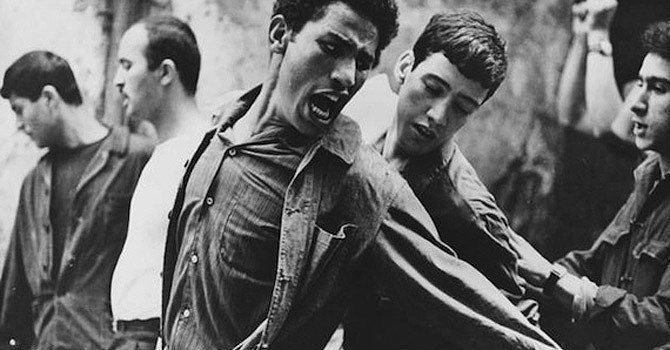
The pride in declaring independence from a colonial country and the ensuing battle for liberation is why many in the United States of America are so keen to celebrate Independence Day, better known as the Fourth of July, even though most these days just use it as a reason to break out the BBQ.
Still, as I thought about what the holiday and liberation means to African-Americans, as well as Africans and those of African descent, I was pressed to think of a war movie in the veins of The Patriot (2000), Johnny Tremain (1957) or even Saving Private Ryan (1998) that reflects those ideals in planning and execution in Black or Black-themed film.
While no films based in the United States dealing with African-Americans came to mind, a true film classic did, the 1966 Italian-made film The Battle of Algiers.
The Criterion Collection synopsis describes it best: “One of the most influential political films in history, The Battle of Algiers, by Gillo Pontecorvo, vividly re-creates a key year in the tumultuous Algerian struggle for independence from the occupying French in the 1950s. As violence escalates on both sides, children shoot soldiers at point-blank range, women plant bombs in cafés, and French soldiers resort to torture to break the will of the insurgents. Shot on the streets of Algiers in documentary style, the film is a case study in modern warfare, with its terrorist attacks and the brutal techniques used to combat them. Pontecorvo’s tour de force has astonishing relevance today.”
Battle was so politically controversy at that time that in France it was banned for years, not playing there until 1974. The film’s sympathetic treatment of the National Liberation Front dismayed former French colonists of Algiers and French army troops. It’s even rumored that the Black Panthers used Battle in guerrilla tactic training.
The film is available on DVD and Blu-Ray and can be watched instantly on HULU Plus. On all three versions is also a featurette entitled Marxist Poetry: The Making of “The Battle of Algiers,” a documentary featuring interviews with Pontecorvo, Gatti, and composer Ennio Morricone. There are also interviews with Spike Lee, Mira Nair, Julian Schnabel, Steven Soderbergh, and Oliver Stone on the film’s influence, style, and importance.
Another noteworthy film that reflects the battle for independence, albeit on African land, is Raoul Peck’s 2000 film Lumumba. The film is centered on the eponymous character Patrice Lumumba and shows he and his cohorts’ struggles for independence from Belgium in the Democratic Republic of the Congo.
While in this film independence is thankfully achieved, the peace does not last lone as Lumumba, played wonderfully by actor Eriq Ebouaney, is sworn in as the Prime Minister of the DRC and instantly must struggle to keep the country afloat from moderates in his own new government and anarchists, including from agents of the Belgian and US government. He would be forced out from his position in two months and soon ousted from the country and executed that next year. Lumumba can be found on Netflix, instant play and DVD options, as well as on DVD from many retailers.
While other noteworthy films like Quilombo (1984) and La última cena (The Last Supper, 1976) deal with slave revolts, The Battle For Algiers and Lumumba depict direct involvement in actual independence from colonial forces within their countries that citizens of Algeria and the Democratic Republic of Congo, respectively, remain proud of just like the spirit of the Fourth of July does for American idealism.
Curtis Caesar John is the Film Editor for Bold As Love Magazine. Follow him on Twitter at @MediaManWatch

